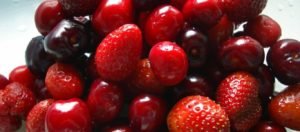Undoubtedly, strawberries are a favorite fruit of young and old. In fact, today there are over 600 varieties.
Strawberries are sweet, slightly spicy berries and are ranked in the top 10 fruits and vegetables for their antioxidant content.
The benefits of eating fruits and vegetables of all kinds, including strawberries, vary. As the consumption of plant foods increases, the risk of heart disease, diabetes and cancer decreases.
High intake of fruits and vegetables is also associated with healthy skin and hair, increased energy and healthier body weight. Increasing the consumption of fruits and vegetables significantly reduces the risk of obesity and overall mortality.

Strawberries: Benefits
Strawberries have a number of potential health benefits and can help protect against a number of diseases.
1) Heart disease
A Harvard study found that regular consumption of anthocyanins, a class of flavonoids found in berries, could reduce the risk of heart attack by 32% in young and middle-aged women.
The flavonoid quercetin contained in strawberries is a natural anti-inflammatory that appears to reduce the risk of atherosclerosis and protect against the damage caused by “bad” cholesterol (LDL) in animal studies.
The high polyphenol content of strawberries can also reduce the risk of cardiovascular disease by preventing platelet aggregation and lowering blood pressure through anti-inflammatory mechanisms.
Other studies have shown that strawberries help lower the levels of homocysteine, an amino acid in the blood associated with the destruction of the lining of arteries.
Also, the fiber and potassium in strawberries support heart health. In one study, participants who consumed 4,069 mg (mg) of potassium per day had a 49% lower risk of dying from ischemic heart disease compared with those who consumed about 1,000 mg of potassium per day.
2) Stroke
The antioxidants quercetin, kaempferol (kaempferol) and anthocyanins have been shown to reduce the formation of harmful blood clots associated with stroke. High potassium intake has also been linked to a reduced risk of stroke.
3) Cancer
The powerful antioxidants in strawberries can work against free radicals, preventing the growth of tumors and reducing inflammation in the body.
4) Blood pressure
Due to their high potassium content, strawberries are recommended for people with high blood pressure to help counteract the effects of sodium on the body. Low potassium intake is as important a risk factor for developing hypertension as high sodium (salt) intake.
Also, high potassium intake is associated with a 20% reduction in the risk of death from all causes.
5) Constipation
Eating foods high in water and fiber, such as strawberries, grapes, watermelon and melon, can help keep your body hydrated and your bowel movements normal.
6) Diabetes
Strawberries are a food with a low glycemic index and high fiber content, a combination that helps regulate blood sugar without major fluctuations.
Strawberries are a smart fruit choice for diabetics, as they have a lower glycemic index (40) than many other fruits.
Researchers discovered in 2011 that eating about 37 strawberries a day can significantly reduce the complications of diabetes, such as kidney disease and neuropathy.
7) Pregnancy
Strawberries are a very good source of folic acid. Adequate folic acid intake is essential for pregnant women to protect themselves from neural tube defects in infants.
Strawberries: Nutrients
Strawberries are rich in vitamin C, potassium, folic acid and fiber. One cup of fresh strawberries contains 160% of the daily recommended amount of vitamin C, with only 50 calories.
One cup of fresh strawberries (166 grams) contains a number of important nutrients in the following amounts:
Calories: 53 kcal
Protein: 1.11 g
Carbohydrates: 12.75 g
Dietary fiber: 3.3 g
Calcium: 27 mg
Iron: 0.68 mg
Magnesium: 22 mg
Phosphorus: 40 mg
Potassium: 254 mg
Vitamin C: 97.6 mg
Folic acid: 40 micrograms (mcg)
Vitamin A: 20 international units (IU)
Strawberries also contain a number of powerful antioxidants, such as anthocyanins, ellagic acid, quercetin and camphor. All of these have been shown to have protective effects against certain types of cancer.
Strawberries: Dangers and Precautions
Each year, the Environmental Working Group (EWG) compiles a list of fruits and vegetables with the highest levels of pesticides.
Strawberries often appear in the list. The EWG recommends that in addition to buying organically grown strawberries, to reduce the risk of exposure to pesticides, wash them thoroughly. Regarding the 2nd, we recommend Zeolite Clean with proven cleaning results by clicking here: https://zeoliteclean.com/en/pistopoiitika/ and search for the Strawberries category!
Posted on

